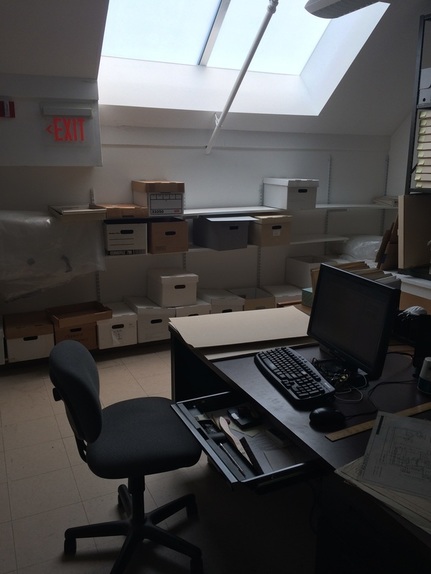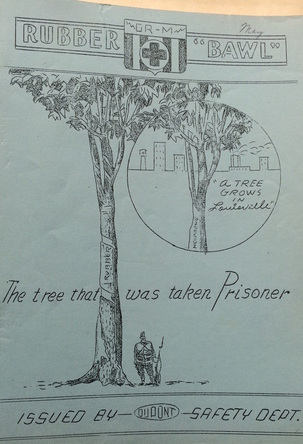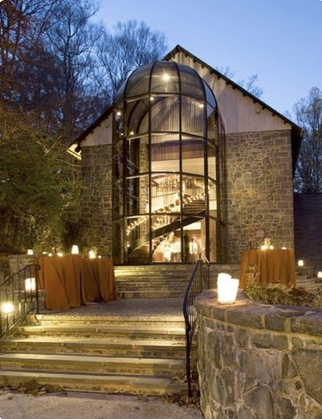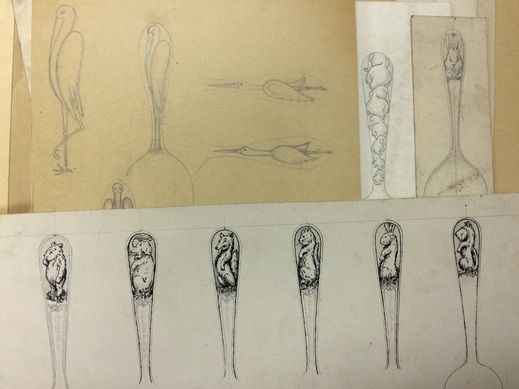A Recap of My 'Day Job'
 How many archives gigs include a desk with a skylight?! Lucky indeed.
How many archives gigs include a desk with a skylight?! Lucky indeed. This summer, I was lucky enough to obtain an internship working in the Manuscript and Archives Department of the Hagley Museum and Library; I needed to find something local, convenient, flexible, and paid, given my obligations to my garden, my dissertation, and my wedding! I was beyond fortunate to work with the delightful staff in the gorgeous Soda House, taking materials from their original boxes as given by the donors, organizing the materials so they are easy for future researchers to access, and rehousing in new folders. I would deaccession duplicates, select materials in need of conservation, and set aside photographs, VHS’s and other materials more appropriate for the Audio-Visual Department to handle. While I had amazing supervisors, support, and guidance, I was given autonomy almost like any other employee. The result was a summer of growth, exploration, skills acquisition, and a surprising love affair with seeing archives from the other side of the reference desk.
Abbreviated List of Materials I Processed (That Researchers Should Know of!)
 *The Rubber Bawl,* May 1944. Dupont Louisville Works Safety Department. Dupont Performance Elastomers LLC, Collection.
*The Rubber Bawl,* May 1944. Dupont Louisville Works Safety Department. Dupont Performance Elastomers LLC, Collection. - Dupont Performance Elastomers LLC, Collection The bulk of this collection is an incredible run of employee news publications from 1943 until 1991 at the Dupont Neoprene plant in Louisville, Kentucky. It was a joy for me to find myself doing accidental research on factory conditions in World War II, as well as to see the evolution of employee culture, interests, and recreations over the years.
- Edy Mozzi Papers - When I was cataloging this, I treated it as its own collection with its own accession number. Since I departed, it has been transformed into Series IV of RCA Camden records. This makes much sense in terms of contents, but my finding aid research was much abbreviated: if you are interested in reading my expanded finding aid information for this series, contact me.
- Electrical Power Systems Records - These records were donated to Hagley by Dr. Julie Cohn; some of them came from her father’s work and career. They also formed a small portion of the research that went into her dissertation, soon to be book manuscript: "Biography of a Technology, North America's Power Grid Through the Twentieth Century". (University of Houston, 2013) As that title might suggest, these papers are those of engineers – primarily former Leeds & Northrup Co. employees – who were involved in the technological problems of connecting power grids across the United States in the 1900s.
- James W. Scarlett Letters - These papers were kindly sent our way by James’ son, Dr. Timothy Scarlett, a professor at Michigan Technological University’s Industrial Archaeology program. Dr. Scarlett was primarily responsible for organizing, writing up historical/biographical context, and creating an inventory of the materials.
- Marconi Wireless Telegraph Company of America Engineering Drawings - I wrote a blog post trying to spark public interest in the materials for the Hagley Sarnoff Project blog entitled: "The Titanic Connection." Read there for more about these incredible artifacts.
- William G. Ramsay Family Correspondence - Really interesting set of letters, bulk 1868-1916 from a figure that Hagley already has materials pertaining to. This collection is most interesting for the correspondence to and from female family members of William. Personal favorites included William’s letters to his wife -- and hers to him:
My Dear Heart Willie -
Did you know I did not realize that you were going today to be away till Thursday -- I felt quite pitiful about it for I really did not say Good-Bye at all --at--all-- I have written five letters this evening ...
[William G. Ramsay Family Correspondence, Box 1, Folder 2. Lena to William (18 letters), 1893-1903]
Take-Aways from My Summer Loft
 Soda House gussied up for a wedding.
Soda House gussied up for a wedding. Indeed, for all the back-ache and sneezing, I took great joy in my work this summer. I discovered an unexpected form of intellectual stimulation; the puzzle of looking at raw materials, figuring out what they are, and trying to see all or many possible angles for research within them – not just approaching with my own lenses of food, environment, social history. These materials could all be used for so many different projects, and help to answer so many different questions. While it wasn’t my job to think of them all, it was my job to organize the materials so they could be most easily used for the widest variety of purposes – and easily accessed by researchers from out of town on pressing time-tables. I think I’ll have a lot more empathy going forward whenever I get frustrated with a finding-aid, outraged by a filing scheme, or can’t find what I need in the first half hour within arriving at a new archive. Thanks for all you do, archivists – especially my amazing co-workers from this summer: Lynn Catanese, Lucas Clawson, Clayton Ruminiski, Chris Baer, and Marsha Mills.
ADDENDUM - MORE HAGLEY
- Stories From the Stacks - researchers on the property talking about their work in audio form!
- CONFERENCE - MAKING MODERN DISABILITY: HISTORIES OF DISABILITY, DESIGN, AND TECHNOLOGY October 28.
- Author Talks - hosted in the Soda House, featuring new books based on Hagley archival holdings
- Research Seminars - scholars present works-in-progress, pre-circulated with RSVP, for comment and discussion.

 RSS Feed
RSS Feed